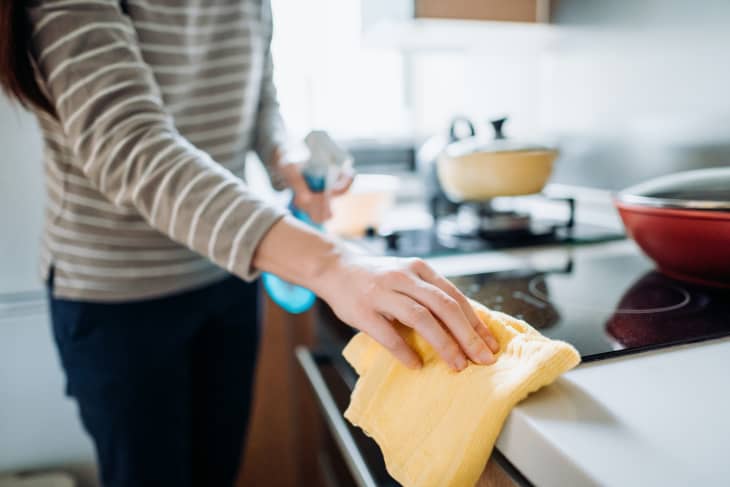We Asked 5 Professional House Cleaners What They Use to Clean at Home — Here’s What They Had to Say
There’s no magic wand that keeps a home sparkling clean. (If you’re working on one, though, please send us an email! And a prototype!) That said, you do need to arm yourself with the right tools. Which begs the question: What counts as “the right tools?” We asked five professional house cleaners what they use to clean in their homes. Because nobody knows better than the pros. Here’s what they had to say.
1. A high-quality microfiber cloth
Abe Navas, the general manager of Emily’s Maids in Dallas, swears by microfiber cloths as a multi-tool. “People underestimate how good they actually are for every surface — they trap dust and gunk like nothing else,” he says. Plus, unlike wasteful paper towels, microfiber cloths are reusable. Navas says you can hang on to them for years!
Of course, that’s only if you take care of your microfiber cloths. Clean them frequently, but also carefully. You can throw them in the wash with your normal laundry soap, but avoid tossing them in the dryer. Navas says heat exposure from the washer or dryer can quickly damage or even ruin a microfiber cloth.
Buy: AmazonBasics Microfiber Cleaning Cloths, $13.12 for 36
2. Distilled white vinegar
Jon Gibbons, a professional cleaner and consultant for Smart Vacuums, keeps his favorite cleaning product in his kitchen cupboard: white vinegar. Not only is vinegar antibacterial, which means it works wonders as a household cleaner and disinfectant, but it’s also acidic, which allows it to cut through grease and grime on your stovetop, in your oven, or on tile.
Have some vinegar on hand? You can use it neat or dilute it with water, depending on the level of strength you need for the task at hand. It’s also safe to use on most surfaces, including wood, stone, metal, porcelain, and tile. “There’s nothing that white vinegar can’t do, and it’s completely natural to avoid further damage to the environment,” Gibbons says.
Buy: Great Value Distilled White Vinegar, $2.90 for one gallon at Walmart
3. A pumice scouring stick
Irina Nikiforova, the owner of the LA-based cleaning service Rocket Maids, says a pumice stone helps her with deep cleaning. “It works magic on ovens that haven’t been cleaned in a while or have burn spots on them — even spots that were left after cleaning with professional oven cleaner,” she says. “This stick is also great for those terrible hard water rings in your toilet.”
To use a pumice scouring stick, Nikiforova recommends simply wetting it with water and gently working on the stain with circular motions. “It doesn’t require lots of elbow grease, and spots will come off easily,” she says.
Buy: Pumie Scouring Stick, $9.25 for two
4. A melamine cleaning sponge
Melamine sponges, commonly known as Magic Erasers, are Nikoforova’s favorite “green” way to clean just about everything in her house — especially scuffs or stains on light walls, floors, or countertops. Plus, melamine, which only requires a bit of water, is totally safe to use on your stainless steel appliances!
Buy: Mr. Clean Magic Erasers, $4.94 for six
5. Soap and water
Laura Smith of All Star Cleaning Services says she’s used just about every product imaginable in her 15 years of work. But at home, she relies on plain old soap and water: “A small squirt of a natural dish liquid like Seventh Generation in a spray bottle of water will clean every surface in your home, including stainless steel,” she says. “Straight dish soap is excellent at breaking up grease in the kitchen, as well as soap scum in the bathroom, which is primarily composed of grease from body oils.” Serious tip: Use dish soap to clean your bathtub.
Buy: Seventh Generation Liquid Dish Soap, $6.00 for 25 ounces
6. Isopropyl alcohol
When germs are involved, Ilya Ornatov of NW Maids Cleaning Service in Seattle skips the disinfecting wipes (which are hard to find these days, anyway!) and instead uses 70% Isopropyl alcohol with a microfiber cloth or paper towel. Because alcohol is just as effective and won’t damage surfaces in your home or leave toxic residue on your hands.
Buy: Equate 70% Isopropyl Alcohol, $7.50 for one 32-ounce bottles
What are the cleaning supplies you swear by? Tell us in the comments below.
